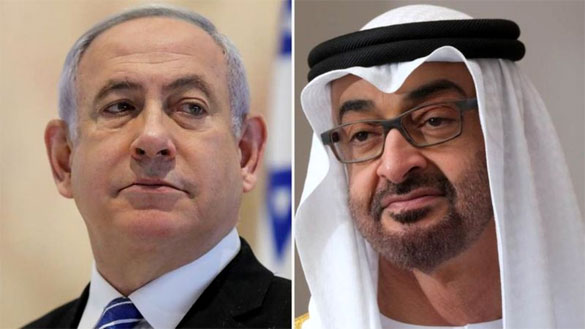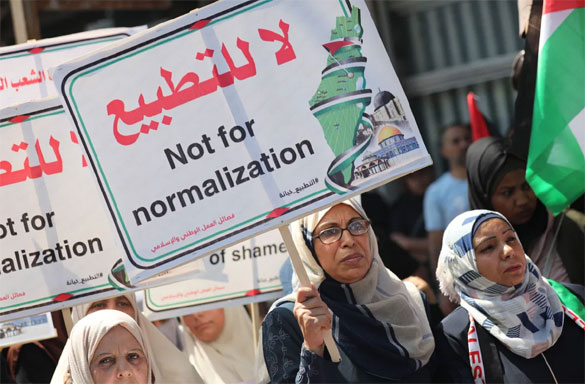
By Arshad Alam, New Age Islam
21 September 2020
A momentous change is taking place in West Asia; one which has the potential to fundamentally alter the ideological and political landscape of the region. The moves by UAE and Bahrain to recognise the state of Israel, have diplomatic relations and establish normal ties has upset decades of anti-Jewish politics within the Arab world. This push towards ‘normalization’ is not just seen within West Asia but also in central Asian countries like Serbia and Kosovo. There is a strong possibility that this process will not stop with these countries but will be followed by more countries, especially Saudi Arabia. It was lost on no one, that Bahrain, a vassal state of Saudi Arabia, could not have established ties with Israel without the formal approval of Saudis.

Benjamin Netanyahu and Prince Mohammed Al Nahyan brokered the agreement with U
-----
After Mohammad Bin Salman takes over, the country might move towards full normalization of relations with Israel. What is also interesting is that representative Arab bodies have not protested the move, as was expected, which gives the impression that such a strategy must have been long in the making. The only whimper of protest one heard was from Turkey and Egypt and ironically both these countries already have normal relations with Israel.
What explains this turn of events? Commentators have been quick to point out that falling oil revenues will make it difficult for these Arab states to finance their countries, as oil revenues make up nearly half of all revenues. The UAE has already moved towards a service economy and experiments in rest of the Arab kingdoms are pointing towards this trend. The fall in oil revenues will directly affect daily provisions of citizens in these countries. The way in which the partly rentier economies of Arab states have worked is that nearly forty percent of all revenues generated have gone into making people’s lives better. From free education and health to subsidized housing and low cost of living, Arab states have seen to it that their citizens are not ‘inconvenienced’ in any way. On the other side of the bargain, citizens are not supposed to raise uncomfortable questions on the nature of state or even the lifestyles of these Arab monarchs. This ideological and de-politicised entente between Arab rulers and their people sustained itself because of the oil boom and the money that it brought. That honey moon might be getting over soon.

Palestinians gather to protest a deal between the United Arab Emirates (UAE) and Israel to normalize ties in Gaza City, Gaza on August 19, 2020. Photo: AFP Forum via Anadolu Agency/ Mustafa Hassona
------
In order to generate more revenue, these states will have to start taxing their citizens. Raised on the notion and practice that the monarch must provide to maintain their standard of life, that prices should be low and essential services should be free, it will be exceedingly difficult for Arabs to adjust to this new order. This will certainly lead to social discontent and questions will be raised regarding the legitimacy of the monarchy. Let us not forget that the legacy of Arab spring has not died down, that its impact is still being felt countries like Tunisia. Let us also not forget that Arab spring toppled seasoned dictators and those horrifying images must have shocked some of these monarchs. Let us also not forget that the Arab spring coincided with a rise in prices of essential commodities across Arab states, something which might repeat itself in the future.
In normalizing relations with Israel, these Arab states are taking the long term view of how to effectively deal with any future protest that might erupt on their soil demanding a representative government and rule of law. Israel, with its technology, will be a valuable ally to crush any such future dissent. Through the years, Israel has developed surveillance technologies which it has put to effective use in targeting Palestinians and their legitimate rights. Not just within Palestine, but this technology has been put to effective use in varied contexts such as Xinjiang and Venezuela. In trying to mollycoddle with Israel, it becomes increasingly clear that what the Arab states fear the most is the possible uprising of their own population.

This realignment of forces in West Asia is also designed to make Iran the prime enemy. Discourses will be manufactured as to how Iran, because of its nuclear ambitions, has become a clear and present danger for the world. The Americans, through their blunder in Iraq, have already made Iran much more powerful than it ever was. Post the Iraq war, Iran now wields considerable influence in Iraq, Yemen and Lebanon. The people of Bahrain are largely sympathetic to the Shite regime in Iran. In the emerging scenario, when the Arab states are seen as abandoning the ‘Palestinian cause’, there is a very real possibility that Iranian popularity in the region is only going to increase. This will again become extremely worrisome for Arab states, as whatever the flaws, Iranians elect their own government, as opposed to the corrupt monarchical rule under which most of the Arabs live. Nothing will be more disastrous for these Arab monarchs if Iran becomes the aspirational model for the people of West Asia. Again, the potential growing clout of Iranians can only be put down successfully by having an ally which has experience in such ‘small wars’.
The West and Israel do not want democracy in the Arab world. That’s why they were deeply involved in bringing back the military regime in Egypt. For years, they have become accustomed to doing business with select monarchs, who they believe are a force of stability in the region. They are probably correct to assume that in a democratic Arab world, the general mood and sentiment will remain against them. This alliance between Arab states and Israel is an attempt to put together an infrastructure of domination in order to keep Arab populations in check. The memory of people taking over the streets hasn’t faded yet, and there is no reason to believe that people will not reclaim those streets once again. Some of the Arab monarchs were clearly not prepared to handle the first time it happened; those that remain definitely want to be better prepared this time.
Arshad Alam is columnist with NewAgeIslam.com
New Age Islam, Islam Online, Islamic Website, African Muslim News, Arab World News, South Asia News, Indian Muslim News, World Muslim News, Women in Islam, Islamic Feminism, Arab Women, Women In Arab, Islamophobia in America, Muslim Women in West, Islam Women and Feminism




 Moderate Islamist here
Moderate Islamist here


0 comments:
Post a Comment